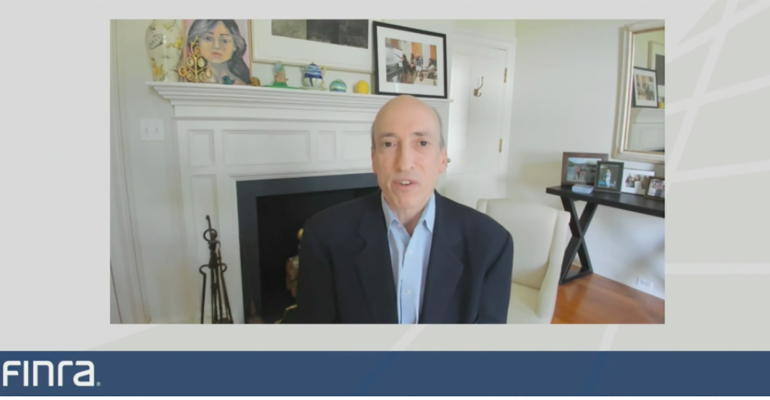Stressing that “best interest means best interest” during a fireside chat at FINRA’s annual conference, SEC Chair Gary Gensler said registered representatives should be wary when they feel they are nearing the line of the regulatory boundaries established by Regulation Best Interest.
“So, if you’re asking a lawyer, accountant or advisor if something is over the line, maybe it is time to step back from the line,” Gensler said during a conversation with FINRA President and CEO Robert Cook. “Remember that going right up to the edge of a rule or searching for some ambiguity in the text or a footnote may not be consistent with the law and its purpose.”
Gensler’s remarks came at the conclusion of a full day of remote panels, where Reg BI’s first year of implementation was a frequent topic of conversation. Gensler said it was important that brokers made best interest determinations for retail investors, and cautioned that disclosure alone may not always suffice.
Gensler said the SEC would look at the new rule with its exam and enforcement functions, but also said further guidance might be possible, echoing testimony he gave in Congress earlier this month. He urged representatives to consider the best interest determination in a straightforward manner.
“What would you want somebody to be advising your sister, your brother, your son, your daughter, your parents, in their best interest?” he said. “It’s just a common sense way to think about it.”
Thus far, SEC and FINRA examiners looking into firms’ initial implementation of Reg BI found a few common areas of trouble. In particular, the commission found some firms restated the rule for employees without providing more pointed guidance about how it could actually apply, said Pete Driscoll, the director of the SEC’s Division of Examinations.
As an example, Driscoll said they found examples of a firm’s procedures requiring that registered representatives consider alternatives and costs when weighing whether a recommendation is best interest, but those procedures didn’t lend insight on what costs to consider or how to identify available alternatives. When it came to training, Driscoll said the SEC was looking to see that firms clarified how the rule would practically apply.
“I think some of the main takeaways from our initial set of exams is the importance on giving registered reps guidance not just on what BI requires, but specific examples of how to accomplish the requirements, basically applying what the law says in a real setting, particularly as most registered reps aren’t lawyers,” he said.
Driscoll noted firms were complying with Form CRS mandates, with many avoiding legalese and making good use hyperlinks (though some firms used boilerplate language or inappropriately described affiliates). However, Driscoll reiterated that hundreds of firms did not file a Form CRS, and some still had not responded after the SEC informally reached out to them inquiring why. Driscoll said the commission was in the process of opening up investigations into those firms.
FINRA sought to see that firms followed instructions, as Form CRS guidance was "pretty prescriptive," said Bill St. Louis, an SVP and firm group leader for the regulator. He said some firms failed to properly fill out the disciplinary history section, with some firms not using that exact heading or failing to give a yes or no response. At a Reg BI roundtable co-hosted by the SEC and FINRA last fall, former SEC Chair Jay Clayton named the Form CRS disciplinary disclosure lapses as one of the more significant issues regulators had uncovered.
But even for those firms that did file their form, some made it available but not easy to find, St. Louis said.
“Another problem we saw was firms who posted it to their website, but didn’t post it in a prominent fashion,” he said. “So, a lot of clicks to find it for the retail investor."




